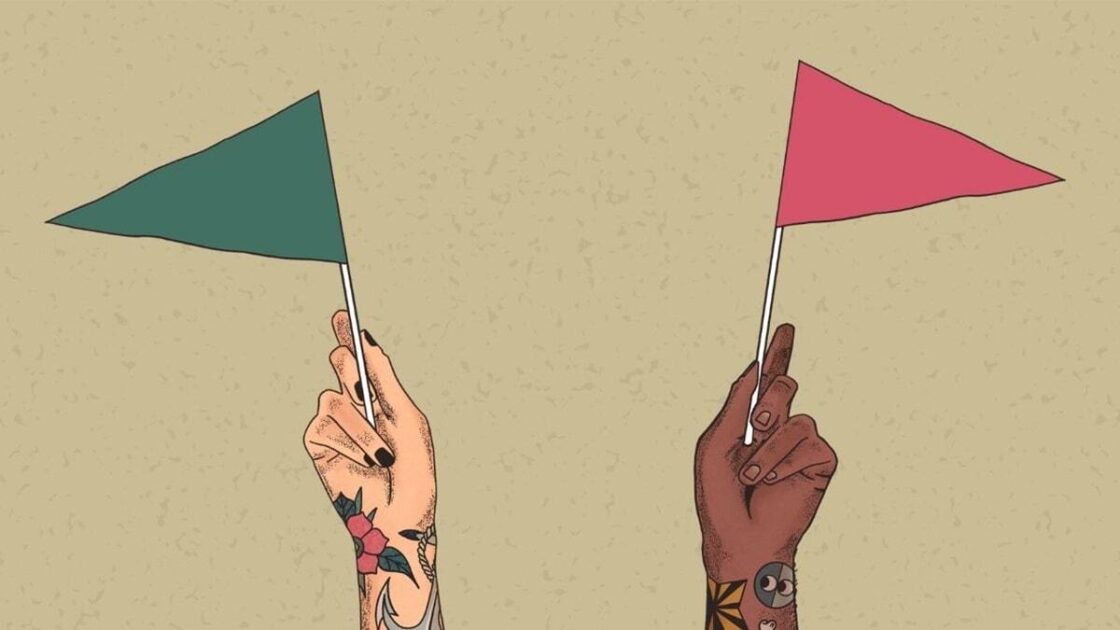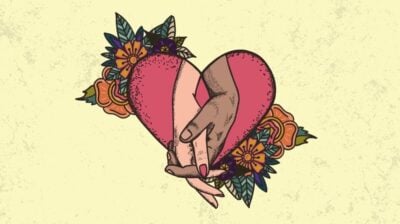8 red flags in relationships
A red flag is a warning sign that someone’s behaviour may be unhealthy.

The relationships we have are very important to our mental and emotional well-being. They can impact how we feel and how we get on in other parts of our lives, like at school, college, or work. Most relationships can go through ups and downs, but if a relationship impacts us negatively more than it does positively, this can be a warning sign that the relationship is overall not good for us.
Sometimes, we can overlook behaviour in a relationship that is unhealthy, as we may not realise it is problematic or because we enjoy certain parts of a relationship. Being able to recognise unhealthy behaviour can allow us to distance ourselves from relationships that are harmful to us, help us set boundaries and create relationships that we enjoy and where we are treated with respect.
We can often be surprised by our own reactions when we get into relationships and if you or your partner notice that you are struggling with insecurity, jealousy or obsession, it is worth seeking help. These things can often go unnoticed until we get into a relationship, so it is almost impossible to deal with them until you are involved in one. The trick is not to take offence when behaviour change is suggested but rather to welcome it and engage with support – the result is often a great relationship and also has the added advantage of increasing self development.
What is a red flag?
The term red flag means a warning sign. When we speak about red flags in relationships, we are normally talking about behaviour that is unhealthy, and that serves as a warning that something in the relationship is not right. Unhealthy behaviour can crop up in any relationship – not just in romantic ones. No matter what type of relationship it is, you deserve to be treated with respect by the people in your life.
Below are some examples of red flags or unhealthy behaviour in relationships. Just one or two red flags can still be a sign of problematic behaviour. Often, it can be hard to see the signs when you’re in a relationship or friendship, and you may not experience all of these things. It’s important not to blame yourself if you’re in an unhealthy relationship. We learn with experience and being able to recognise red flags can help you to build the relationships you want in the future.
1. They want you to spend all of your time with them
A warning sign in a relationship can be that the other person wants all of your attention. They may easily get jealous of other friends or even family members in your life, and they try to make you feel bad about spending time with people other than them. They may deliberately isolate you to gain and maintain control over you.
While time spent together is important in any relationship, you should not be pressured into sacrificing other relationships in your life for the sake of this one. No one should make you feel bad for wanting to see friends or family, and you deserve time to yourself to do the things that you want to do. Someone wanting you to spend all of your time with them can be a sign that they can be controlling and possessive.
2. They try to control you
A warning sign in a relationship can be that the other person tries to control different areas of your life – this can be your time and who you spend it with, where you go and when, what you eat, or how you dress. They could be criticising you, trying to make you more like them, or trying to turn you into the person they want you to be, regardless of how you feel. They might also try to manipulate you into giving them what they want by threatening to break up with you if you don’t go along with them.
Some examples of types of control include:
- Financial Control
- Coercive Control
- Sexual Control
- Physical Control
- Emotional Control
If someone is trying to control you, it is important to remember that you are the only person who can make decisions about your life. You should never feel pressured to dress, act, or be a certain way just to please another person.
3. They get angry easily
A short temper can be another warning sign in a relationship. If someone gets angry with you often – and their anger is usually directed at you rather than at anyone else, this is unhealthy behaviour. Their behaviour could be so bad that you feel like you’re always walking on eggshells to avoid upsetting them. They might be jealous of someone else in your life, or they might not like that you disagreed with them – whatever it is, you have a right to feel safe and respected, and someone who gets angry and makes you feel unsafe is not respecting you.
It is also a sign of an unhealthy situation if the other person is constantly bringing up old arguments or making you feel bad for things that have happened in the past. It is common to have arguments in relationships but if someone holds past issues against you or tries to make you feel guilty, they are not treating you with the respect you deserve.
4. They always accuse you of doing something wrong
If someone is always accusing you of doing something wrong, such as going behind their back or betraying them in some way like cheating, this is unhealthy behaviour. Sometimes people behave this way to try and isolate you from those who care about you and gain more control over you. Trust is important in any relationship, but you are not responsible for making someone feel better about their own insecurities. If you feel you have to hide things from someone, such as spending time with your friends or bumping into an ex, this can be a sign that they are controlling and treating you unfairly in the relationship.
5. They invade your privacy
In an unhealthy relationship, the other person might want to know everything about you. This means that they will cross your boundaries in order to get whatever information they need or to monitor what you’re doing. This could involve looking through your things, your messages, or even demanding passwords to your accounts so that they can keep an eye on you. Behaviour like this can be a red flag. Everyone deserves their own privacy and if someone is constantly monitoring you this behaviour is unhealthy.
Your boundaries are important and need to be respected. Everyone has a right to privacy, and you do not need to give anyone your personal information like passwords.
6. They want to be in constant contact
Many people text each other throughout the day, but if the other person sends you messages all the time, even if they know you are busy or you haven’t responded for a while, this could be a red flag. If they send multiple messages to pressure you into replying and get angry with you if you don’t respond straight away, then they are showing signs of unhealthy behaviour.
We may have our phones on us all the time, but that doesn’t mean we have to use them. It’s okay to want some space and not reply to messages straight away.
7. They force or pressure you to do things you don’t want to do
In an unhealthy relationship, someone might make you do things that you’re not comfortable with, even if you’ve made your feelings clear. This behaviour can often start with small things and become worse over time. Someone may pressure you to go certain places with them, cut people out of your life or dress a certain way. This sort of behaviour is manipulative and not healthy. If someone respects you they should not treat you this way.
You may experience pressure from someone in different ways. One type of pressure you may experience is someone wanting you to engage sexually with them. If someone forces or manipulates you to do anything sexually, this is sexual coercion, which is a form of sexual assault. If they pressure you to take and /or share intimate images or share images you sent them privately with others this is a form of sexual abuse. If they send you sexual images or sexts without your consent, this is also a form of sexual abuse. Learn what to do if you receive unwanted sexts. If you have experienced sexual violence, there are people you can reach out to for support. If you would like to speak to someone about this, the Rape Crisis Centre run a National 24-Hour Helpline at 1800 77 88 88.
8. They are violent or threaten to hurt you or themselves
It is never okay for someone to threaten to hurt themselves or you if you behave a certain way. If you are feeling unsafe in a relationship this is a major warning sign. Your relationships should make you feel safe, and if they don’t then it’s important to know there is help out there. It is not okay for someone to be physically violent even once, nor is it okay for them to threaten you with violence.
Sometimes the person might threaten to hurt themselves if you try to break up with them or end the friendship – this is manipulation, and they are using it as a way to control you and guilt you into staying.
There are specialist domestic violence services throughout Ireland. The majority of domestic violence services are Safe Ireland members, an organisation that provides information and contact details for these services. If you are experiencing any form of abuse in a relationship, you can contact the free Women’s Aid 24-hour helpline to talk in confidence at 1800 341 900, or contact Men’s Aid at 046 9023718 to find support for men experiencing an abusive relationship or the Men’s Development Network at 1800 816 588. These services can also be contacted by people who are neither a man nor a woman, such as non-binary people.
Support if you are worried about your relationship
If you are worried your relationship could be abusive, it can help to reach out to other people in your life and let them know what’s going on and how they can help. If you feel like you can’t talk to someone you know, or you need additional support, look into going for counselling with an accredited and registered practitioner, or contact the following organisations:
- TooIntoYou has more information on toxic relationships
- Women’s Aid runs a free 24-hour helpline for women and girls who want to talk in confidence about abuse in their relationship: 1800 341 900
- SAFE Ireland (for women and children) provides contact details for centres around Ireland that can offer support and emergency accommodation to women and children
- Men’s Aid offer support for men experiencing abusive relationships
- The Men’s Development Network have a support line that you can call for free at 1800 816 588.
If you’re worried about your own behaviour and think you could be behaving in a toxic or abusive way in your relationships you are brave for facing these patterns and can consider seeking help from a counsellor to help change your behaviour. The Irish Council for Psychotherapy, The Psychological Society of Ireland and The Association of Counselling and Psychotherapy will have lists of accredited professionals in your area.
Feeling overwhelmed or want to talk to someone right now?
- Get anonymous support 24/7 with our text message support service
- Connect with a trained volunteer who will listen to you, and help you to move forward feeling better
- Free-text SPUNOUT to 50808 to begin
- Find out more about our text message support service
If you are a customer of the 48 or An Post network or cannot get through using the ‘50808’ short code please text HELLO to 086 1800 280 (standard message rates may apply). Some smaller networks do not support short codes like ‘50808’.






